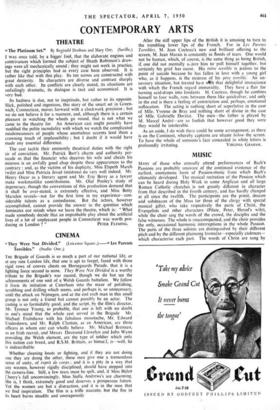CINEMA
"They Were Not Divided." (Leicester Square.)---4, Les Parents Terribles." (Studio One.) THE Brigade of Guards is so much a part of our national life, or at any rate London life, that one is apt to forget, faced with those rigid rows of convex chests on Horseguards Parade, that it is a fighting force second to none. They Were Not Divided is a worthy tribute to the Brigade's war record, though we do but see the achievements of one unit of a Welsh Guards battalion. We follow it from its initiation at Caterham into the maze of polishing, scrubbing and drilling which seems, and perhaps is, so unnecessary, until the attack on Nijmegen, and at the end each man in this small group is not only a friend but cannot possibly be an actor. The casting is so formidably good, and the script, by the film's director, Mr. Terence Young, so probable, that one is left with no doubt in one's mind that the whole cast served in the Brigade Mr. Michael Trubshawe with his fabulous moustache, Mr. Edward Underdown, and Mr. Ralph Clanton, as an American, are three officers in whom one can wholly believe. Mr. Michael Brennan, as an Irish recruit, and Messrs Desmond Llewelyn and John Wynn providing the Welsh element, are the type of soldier which only this nation can breed, and R.S.M. Brittain, as himsel, is—well, he is indescribable.
Whether cleaning boots or fighting, and if they are not doing one they are doing the other, these men give one a tremendous sense of unity, of esprit de corps ; and it is a pity in a way that any women, however rigidly disciplined, should have stepped into the camera-line. Still, a few tears must be spilt, and, if Miss Helen Cheery's fall unconvincingly, Miss Stella Andrews's are charming. She is, I think, extremely good and deserves a prosperous future. Yet the women are but a distraction, and it is in the men that we find inspiration. The film is a trifle staccato, but the fire in its heart burns steadily and courageously After the stiff upper lips of the British it is amusing to turn to the trembling lower lips of the French. For in Les Parenti Terribles, M. Jean Cocteau's new and brilliant offering to the screen, M. Jean Marais is constantly in floods of tears. One would not be human, which, of course, is the same thing as being British, it one did not mentally aojure him to- pull himself together, but certainly his grief has cause. His mere terrible is jealous to the point of suicide because he has fallen in love with a young girl who, as it happens, is the mistress of his pPre terrible. An un- savoury situation, but treated here With that delightful insouciance with which the French regard immorality. They have a flair for turning acid-drops into fondants M. Cocteau, though he confines himself to four walls, runs between them like quicksilver, and only in the end is there a feeling of constriction and, perhaps, emotional suffocation. The acting is nothing short of superlative in the case of Mlle. Yvonne de Bray and nothing short of divine in the case of Mlle. Gabrielle Dorziat. The men—the father is played by M. Marcel Andre—are so foolish that however good they were they would be intolerable.
As an aside, I do wish there could be some arrangement, as there is on the Continent, whereby captions are situate below the screen. To have the whole of someone's face concealed in white letters is






































 Previous page
Previous page